


Der Alltag ist stark von der Kommunikation in den sozialen Medien geprägt, insbesondere bei jungen Menschen. Auch wenn diese Dienste es Menschen ermöglichen, in Echtzeit rund um den Globus zu kommunizieren, sind in den letzten Jahren Probleme wie Echokammern, Filterblasen oder Fake News entstanden. Diese Phänomene beeinflussen auch gesellschaftliche Diskurse über Themen wie den Klimawandel und führen zu digitalen Räumen, in denen wissenschaftliche Fakten offen geleugnet werden. Aufgrund dieser Entwicklung besteht ein Bedarf an weiteren Erkenntnissen über die Rolle der sozialen Medien für den Klimawandeldiskurs.
Eine interdisziplinäre Perspektive der naturwissenschaftlichen Bildung
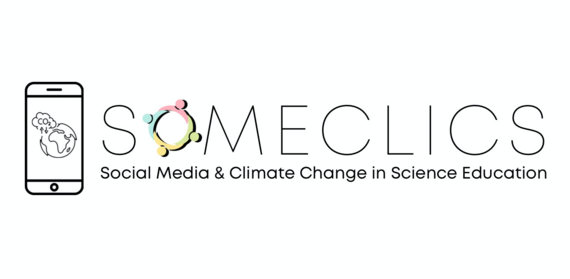
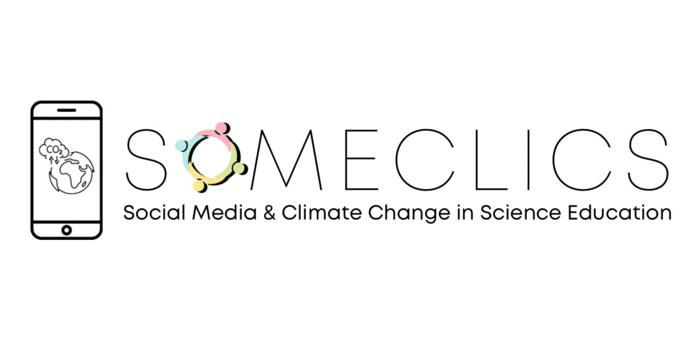
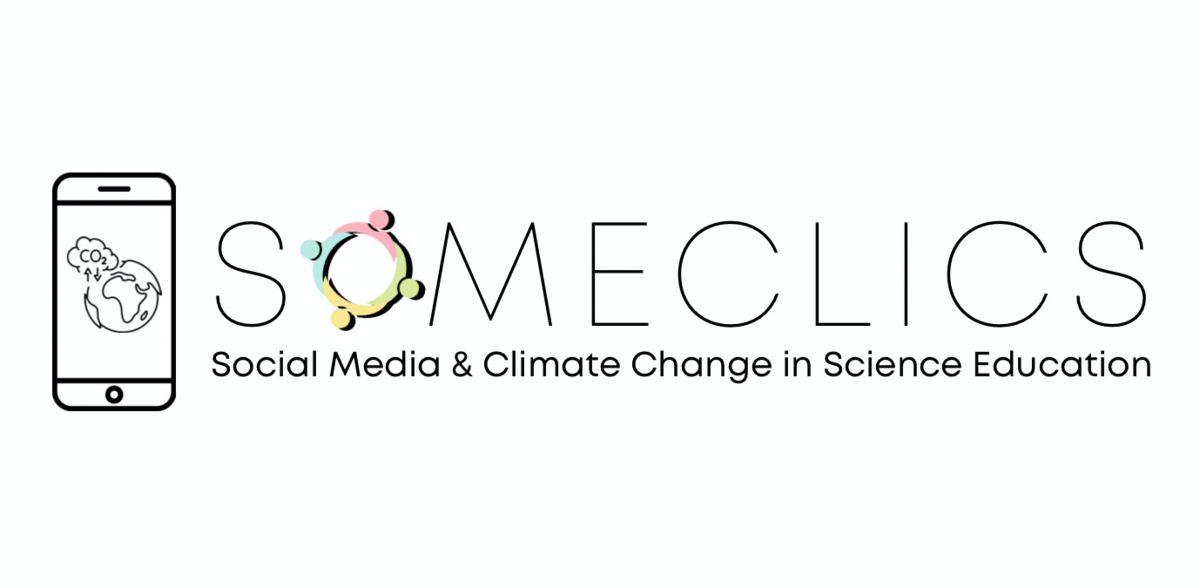
Im Rahmen von SoMeCliCS wenden wir die Perspektive der wissenschaftlichen Bildung an, um (1) die Nutzung, (2) die erforderlichen Kompetenzen und (3) die Möglichkeiten für Interventionen zur Förderung dieser Kompetenzen zu untersuchen. Dabei wenden wir (4) digitale Methoden an.
Forschungsansatz
-
Was sind soziale Medien?
Soziale Medien beschreiben eine Vielzahl von Plattformen, die die Kommunikation mit anderen Menschen über internetbasierte Dienste ermöglichen (Carr & Hayes, 2015). Innerhalb der sozialen Medien können verschiedene Kategorien wie soziale Netzwerke (z.B. Facebook, Twitter) und soziale Messenger (z.B. WhatsApp, Telegram) unterschieden werden.
-
Warum „aus der Perspektive der naturwissenschaftlichen Bildung"?
Soziale Medien sind kein neues Phänomen, weshalb bereits viele Studien die Rolle der sozialen Medien untersucht haben. So konnten beispielsweise mit Big-Data-Analysen die Auswirkungen von Echokammern untersucht werden (z. B. Williams et al., 2015). Allerdings lassen diese Studien die psychologische Perspektive der sozialen Medien oft außer Acht (Montag et al., 2016).
Der naturwissenschaftliche Unterricht (Biologie-, Chemie- und Physikunterricht) nimmt hier eine herausragende Stellung ein, da er das jeweilige inhaltliche Wissen mit relevanten pädagogischen und psychologischen Prozessen verbindet. Wir verstehen das Betrachten und Verarbeiten von fachbezogenen Inhalten in sozialen Medien als informelles Lernen, das wir aus wissenschaftspädagogischer Sicht untersuchen.
Neben dieser verbindenden Rolle der Wissenschaftsdidaktik unterstützen Forscherinnen und Forscher des L3S das Projekt durch die Entwicklung moderner Computertechniken zum Erfassen der großen Datenmengen.
-
Warum zum Thema Klimawandel?
Auch wenn die möglichen Auswirkungen des Klimawandels seit vielen Jahren bekannt sind, wurde bisher kein ausreichender Ansatz zur Eindämmung des Klimawandels entwickelt. Während die Wissenschaft hinter dem Thema komplex und daher schwer zu verstehen ist, sind die Menschen auch mit motivierten Vorurteilen konfrontiert, die in den sozialen Medien durch Phänomene wie Echokammern, Filterblasen und Fake News gefördert werden können.
Angesichts der Dringlichkeit des Themas Klimawandel glauben wir, dass das Thema ein perfektes Beispiel ist, um die Auswirkungen sozialer Medien auf wissenschaftliche Themen zu entschlüsseln. Die Ergebnisse können daher auch zu einem breiteren Verständnis von sozialen Medien in der Gesellschaft beitragen und Wege aufzeigen, wie man sich auf das Leben in modernen digitalen Gesellschaften vorbereiten kann.
Forschungsrahmen
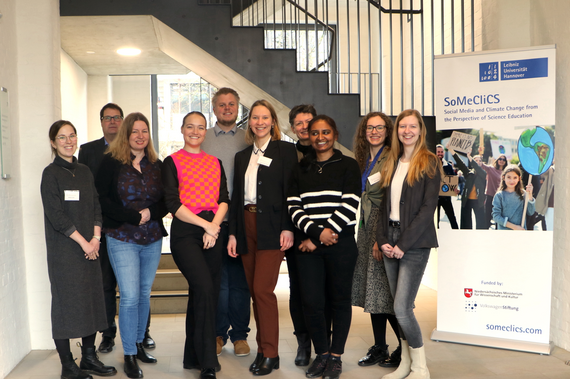
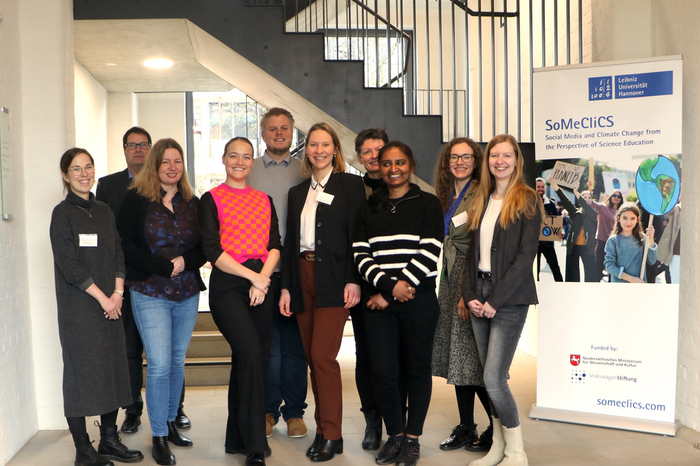
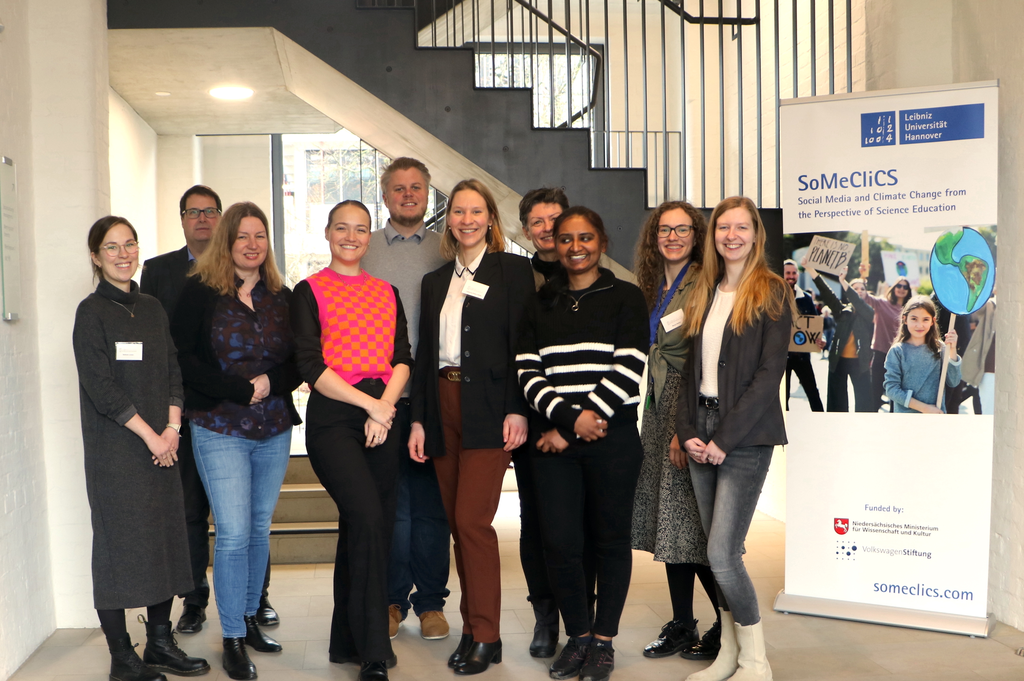
-
Projektüberblick
Das Gesamtprojekt wird durch fünf verschiedene Teilprojekte definiert, die alle spezifische Ziele verfolgen. Zunächst interessieren wir uns für die Nutzung (usage U) von sozialen Medien für das Thema Klimawandel. Darauf aufbauend definiert das nächste Paket die erforderlichen Kompetenzen (literacies L), die für ein kompetentes Handeln in sozialen Medien erforderlich sind. Beide Pakete informieren über mögliche Interventionen (interventions I), die Wege zur Förderung der Kompetenzen in formalen Lernkontexten beschreiben. All diese Projekte werden durch das Paket der digitalen Methoden (digital methods DM) unterstützt, in dem das L3S die Forschung mit Methoden aus der Informatik unterstützt.
Was die Publikation der Projektergebnisse anbelangt, so tragen alle Teilprojekte zu dem abschließenden Paket Wissenschaftskommunikation (science communication SC) bei, das die Sichtbarkeit im Internet, eigene wissenschaftliche Konferenzen und einen Sammelband umfasst.
Plan der Projektstruktur
![]()
![]()
![]()
Zeitplan
Das Projekt begann im Juli 2021 und wird im Jahr 2024 abgeschlossen sein. Im ersten Jahr wurde das Projekt einrichtet und mit den ersten Forschungspaketen begonnen. Im März 2022 wurde das Kick-off-Meeting abgehalten, bei dem die Forschungsstrategien weiter diskutieren werden konnten. Im März 2023 fand ein erneutes Treffen statt. Zu Gast waren verschiedenste Forschende, welche sich mit sozialen Medien in Bezug auf die Klimabildung beschäftigen. Diese werden auch einen Teil zum Sammelband beisteuern, welcher im letzten Projektjahr veröffentlicht wird. Das Projekt endet mit einer Abschlusspräsentation und der Übergabe der Projektergebnisse.
-
Teilprojekte
Wie in der Projektübersicht beschrieben, haben wir insgesamt vier Hauptforschungspakete: Nutzung, Kompetenzen, Interventionen und digitale Methoden. Jedes dieser Projekte beinhaltet eigene Forschungsziele, die auf dieser Seite näher beschrieben werden. Am Ende der Seite finden Sie eine Übersicht über unsere jüngsten Veröffentlichungen zu den Projektthemen.
Nutzung (usage)
Ein erstes Ziel unseres Projekts ist es, herauszufinden, wie Menschen und insbesondere Schülerinnen und Schüler soziale Medien für das Thema Klimawandel nutzen. Im Rahmen dieses Ziels untersuchen wir die allgemeine Rolle der sozialen Medien (U1) und mögliche Verbindungen (U2) mit anderen Variablen. Für die Rolle der sozialen Medien wenden wir derzeit qualitative Methoden an, um zu untersuchen, wie Menschen soziale Medieninhalte in sozialen Medien wahrnehmen. Als letztes Ziel werden wir die Ergebnisse auf ein größeres Publikum verallgemeinern (U3).
Please note that activating the video will result in the transfer of data to the respective provider. Further information can be found in our privacy policy.
Play videoKompetenzen (literacies)
Das zweite Hauptziel des Projekts besteht darin, die erforderlichen Kompetenzen für das Thema Klimawandel in den sozialen Medien zu definieren. Dazu führen wir zunächst eine systematische Literaturrecherche (L1) über relevante bestehende Kompetenzen durch und benennen dann die Kompetenzen (L2) für Schülerinnen und Schüler. Im letzten Schritt werden mögliche Einflüsse auf diese Kompetenzen untersucht (L3).
Please note that activating the video will result in the transfer of data to the respective provider. Further information can be found in our privacy policy.
Play videoInterventionen (interventions)
Das Ziel des dritten Teilprojekts ist es, Möglichkeiten zur Förderung der definierten Kompetenzen in Interventionen zu untersuchen. Um die Auswirkungen dieser Interventionen untersuchen zu können, entwickeln wir ein Messinstrument (I1), das dann in einer untersuchungsorientierten (I2) und trainingsorientierten (I3) Intervention eingesetzt wird.
Please note that activating the video will result in the transfer of data to the respective provider. Further information can be found in our privacy policy.
Play videoDigitale Methoden (digital methods)
Während die Pakete auf relevante fachspezifische Forschungsfragen ausgerichtet sind, erfordern die Methoden bestimmte Fähigkeiten im Hinblick auf digitale Methoden. Dazu gehört der Einsatz von Techniken wie maschinelles Lernen oder Eye-Tracking, um die Rolle sozialer Medien für den naturwissenschaftlichen Unterricht in einem größeren Datensatz aufzudecken, indem eine hohe Auflösung der Lernprozesse ermöglicht wird.
Please note that activating the video will result in the transfer of data to the respective provider. Further information can be found in our privacy policy.
Play videoFür alle Pakete planen wir verschiedene Aktivitäten zur Kommunikation unserer Ergebnisse. Dazu gehören die Sichtbarkeit im Internet (SC1), verschiedene wissenschaftliche Sitzungen (SC2) und ein Sammelband am Ende des Projekts (SC3).
-
Projektbeteiligte
Das Projekt ist eine Kooperation des Instituts für Didaktik der Naturwissenschaften und des Forschungszentrums L3S der Leibniz Universität Hannover. Wir arbeiten auch mit Kollegen von der Justus-Liebig-Universität Gießen zusammen.
Die Projektleitung liegt zwar beim Institut für Didaktik der Naturwissenschaften, aber es arbeiten verschiedene Personen an dem Projekt mit. Einen Überblick über alle beteiligten Personen in alphabetischer Reihenfolge und ihre Rollen finden Sie in der nachfolgenden Tabelle.
Oleh Astappiev
Forschungszentrum L3SExperte für LearnWeb-Plattformen
![]()
![]()
![]()
Dr. Alexander Büssing
Institut für Didaktik der Naturwissenschaften
Leibniz Universität HannoverProjektleiter und Leiter des Teilprojekts Nutzung (usage)
![]()
![]()
![]()
Dr. Marco Fisicella
Forschungszentrum L3SExperte für Artificial intelligence
![]()
![]()
![]()
Prof. Dr. Gunnar Friege
Institut für Didaktik der Mathematik und Physik
Leibniz Universität HannoverLeiter des Teilprojekts Interventionen (interventions)
![]()
![]()
![]()
Prof. Dr. Kerstin Kremer
Institut für Biologiedidaktik
Justus-Liebig-Universität GießenLeiterin des Teilprojekts Nutzung (usage)
![]()
![]()
![]()
Soraya Kresin
Institut für Didaktik der Naturwissenschaften
Leibniz Universität HannoverDoktorandin Teilprojekt Nutzung (usage)
![]()
![]()
![]()
Dr. Stephanie Lenzer
Leibniz-Institut für die Pädagogik der Naturwissenschaften und Mathematik, KielTeilprojekt Kompetenzen (literacies)
![]()
![]()
![]()
Dr. Ivana Marenzi
Forschungszentrum L3SProjektleiterin Teilprojekt digitale Methoden (digital methods)
![]()
![]()
![]()
Prof. Dr. Andreas Nehring
Institut für Didaktik der Naturwissenschaften
Leibniz Universität HannoverLeiter Teilprojekt Kompetenzen (literacies)
Prof. Dr. Wolfgang Nejdl
Forschungszentrum L3SProjektleiter Teilprojekt digitale Methoden (digital methods)
![]()
![]()
![]()
Catharina Pfeiffer
Institut für Didaktik der Naturwissenschaften
Leibniz Universität HannoverDoktorandin Teilprojekt Kompetenzen (literacies)
![]()
![]()
![]()
Sophia Siegman
Institut für Didaktik der Mathematik und Physik
Leibniz Universität HannoverDoktorandin Teilprojekt Interventionen (interventions)
![]()
![]()
![]()
Apoorva Upadhyaya
Forschungszentrum L3SDoktorandin Teilprojekt Nutzung (digital methods)
Veranstaltungen des Projekts
Symposium 2023
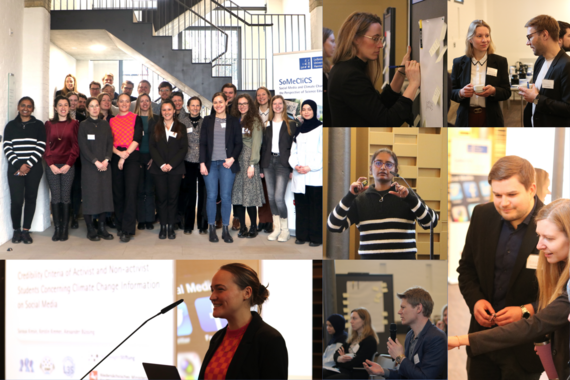
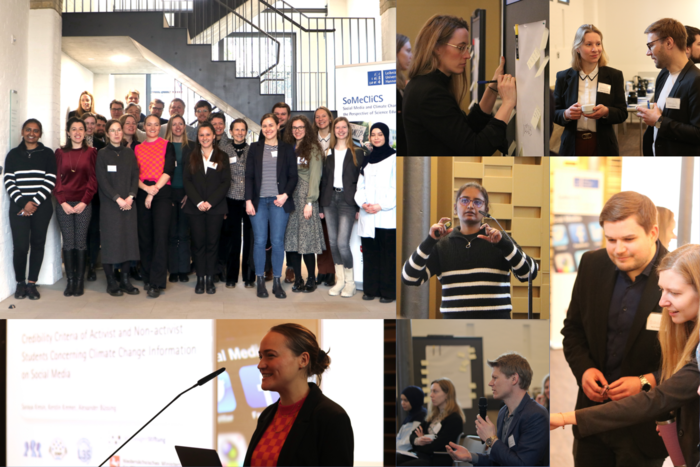
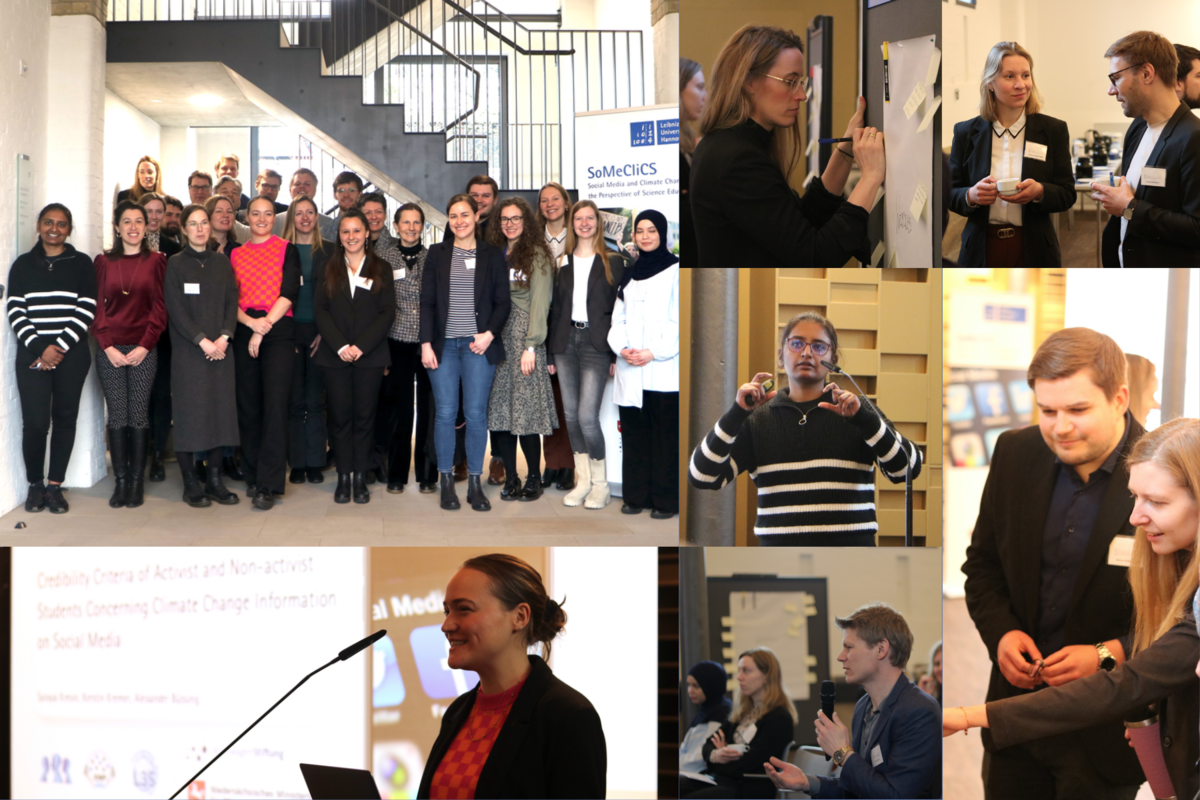
Am 09. und 10.03.2022 hat das Symposium des Projekts SoMeCliCS stattgefunden.
Das Symposium begann am Donnerstag mit der Keynote Lecture, auf der Prof. Dr. Sascha Schanze zu Beginn begrüßende Worte gehalten hat. Es folgte Dr. Alexander Büssing mit einem einführenden Vortrag zum Projekt SoMeCliCS. Den letzten Vortrag steuerte Dr. Friederike Hendricks bei, die in ihrer Keynote zum Thema des Vertrauens in digitalen Medien sprach. Anschließend fand eine Podiumsdiskusstion statt, bei der Personen aus der Forschung, aber auch eine Lehrkraft sowie ein Schüler der Gruppe Fridays for Future über die Rolle sozialer Medien in der digitalen naturwissenschaftlichen Bildung diskutiert haben. Die Runde wurde von Dr. Nadja Belova(Universität Bremen) geleitet. Den Abschluss des Abends bildete ein abschließender Empfang, auf dem der persönliche Austausch vertieft werden konnte.
Am nachfolgenden Tag fanden von allen Beteiligten Vorträge statt, die die Breite der Forschung abdeckten. Neben Vorträgen aus den SoMeCliCS-Projekten waren die Erkennung von Fake News, die Rolle von Nature of Science als Teil der Science Media Literacy sowie Literaturübersichten zur Inoculation Theory oder Interventionen zur Kompetenzförderung weitere Themen.
Einen ausführlichen Bericht finden Sie im Newsbeitrag.
Auftaktveranstaltung | Kick-Off
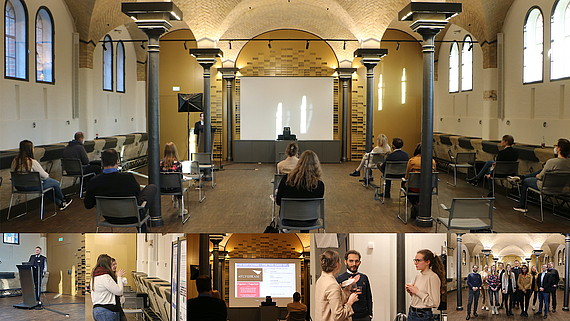
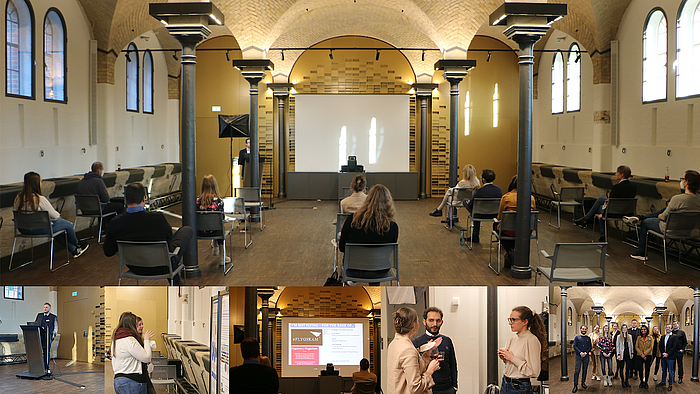
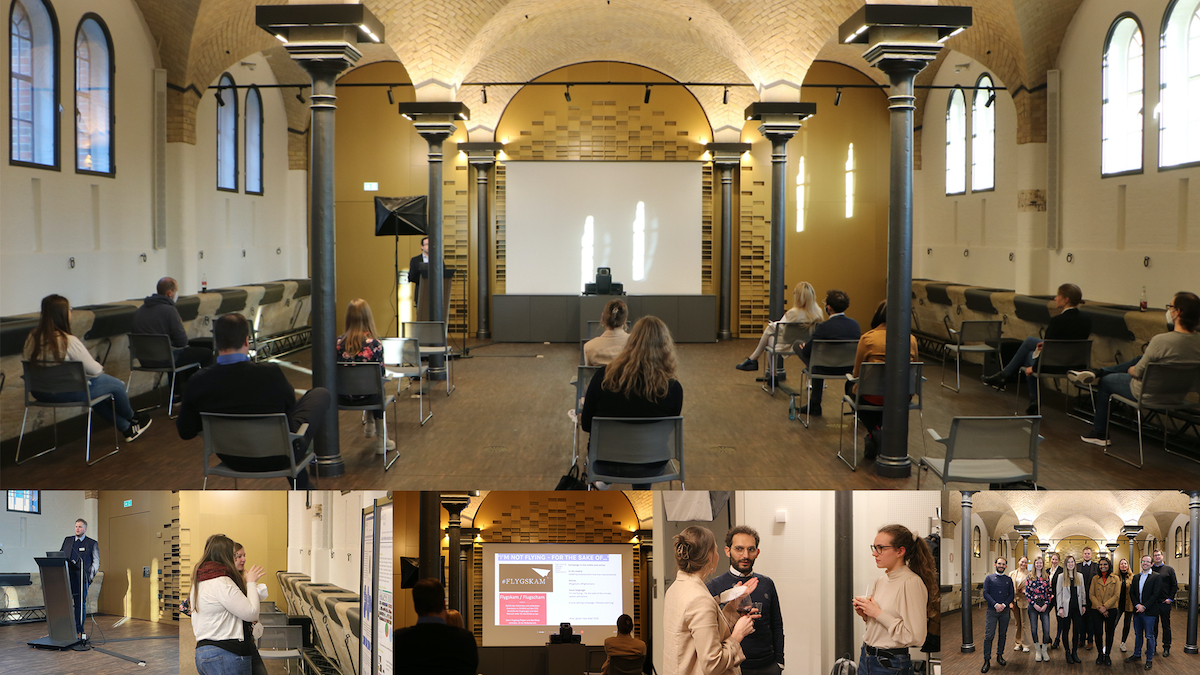
Am 10. und 11.03.2022 hat das Kick-off Meeting des Projekts SoMeCliCS stattgefunden.
Das Kick-off Meeting war auf zwei Tage aufgeteilt. Der Vortragsabend zur Einführung in das Projekt fand am Donnerstag in der schönen Atmosphäre des königlichen Pferdestalls statt und wurde live auf YouTube gestreamt. Anfangs bot Dr. Alexander Büssing unter dem Titel Perspectives on Social Media and Science Education: About SoMeClICS einen Überblick über das Forschungsprojekt. Anschließend fand die Keynote von Prof. Dr. Rogers (University of Amsterdam) statt, der unter dem Titel Where is the urgency in the Climate Change Discourse über die Kommunikation des Klimawandels unter Nutzung moderner Methoden berichtete. In der anschließenden Diskussion wurden gerade diese Möglichkeiten und der interdisziplinäre Charakter des Themas hervorgehoben.
Freitag vormittags haben alle Projektbeteiligten die Möglichkeit gehabt, sich online auszutauschen und produktiv über die einzelnen Teilprojekte diskutiert. Nachmittags ging es um die schulische Praxis des Projekts, hierbei haben Lehrkräfte ihre Sichtweisen dargestellt und spannende Beiträge geliefert. Dabei hat Prof. Dr. Höttecke (Universität Hamburg) die Lehrerfortbildung mit einem Vortrag zum Thema Klimabildung unterstützt.
Einen ausführlichen Bericht finden Sie im Newsbeitrag.
Publikationen zum Projekt SoMeCliCS
Showing results 1 - 11 out of 11














































